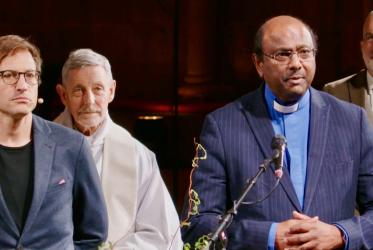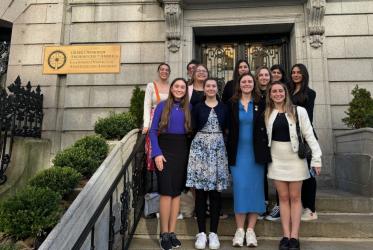People have the right of access to archives of public bodies, argued Trudy Huskamp Peterson, an archivist from the United States, in her recent talk organized by the World Council of Churches (WCC) Archives in Geneva, Switzerland. She said public access to information is particularly relevant for archives documenting human rights violations.
“Both public and private entities should open their archives to the greatest extent possible," she said.
Peterson, former acting archivist of the United States Archives and head of the Records and Archives section of the United Nations High Commissioner for Refugees, made these comments in her presentation titled “No Closure without Disclosure” on 8 May.
Peterson, who has long-time experience of documenting human right violations, and working with the archives of truth and reconciliation commissions in South Africa and Latin America, introduced the Principles of Access to Archives of the International Council on Archives, speaking on their relevance to issues of transparency and the right to information.
Peterson, chair of the Human Rights Working Group and the Working Group on Standard Access Principles of the International Council on Archives, shared several examples from around the world outlining the importance of the right to information, especially in relation to human rights.
Bosnia Herzegovina, Bulgaria, Argentina, the United Kingdom, the United States, El Salvador, Czechoslovakia, Bangladesh, South Korea, Canada and Guatemala are some of the countries she mentioned, where “denial of access to archives” by institutions prevented access to information on human right violations. In such situations, Principles of Access to Archives become even more important, Peterson’s presentation showed.
One of the principles pointed out by Peterson was that institutions holding archives should ensure access to archives to victims of serious crimes under international law. This is true especially when records provide evidence that can help document human right violations, and can help victims assert their human rights, even if such archives are closed to general public.
The presentation by Peterson made several points on how archives should be made available on equal and fair terms. She also shared how access to archives should be facilitated in the interest of historical research, subject to reasonable restrictions aimed at safeguarding the privacy and security of victims and other individuals.
To make justice mechanisms more effective, Peterson stressed that it is necessary for archivists to participate in the decision-making process on access.
She concluded by urging that laws must ensure creation of records on government business, facilitating transfer to archives and charging penalties for destruction of the archives.
ICA - Principles of Access to Archives
Read about role of WCC Archives in documenting human right abuses in Brazil in 1970s







